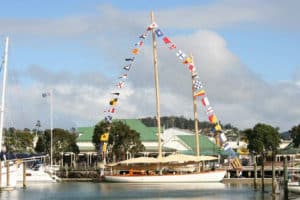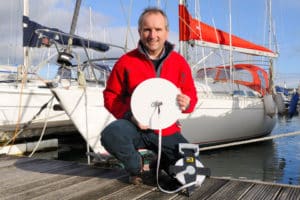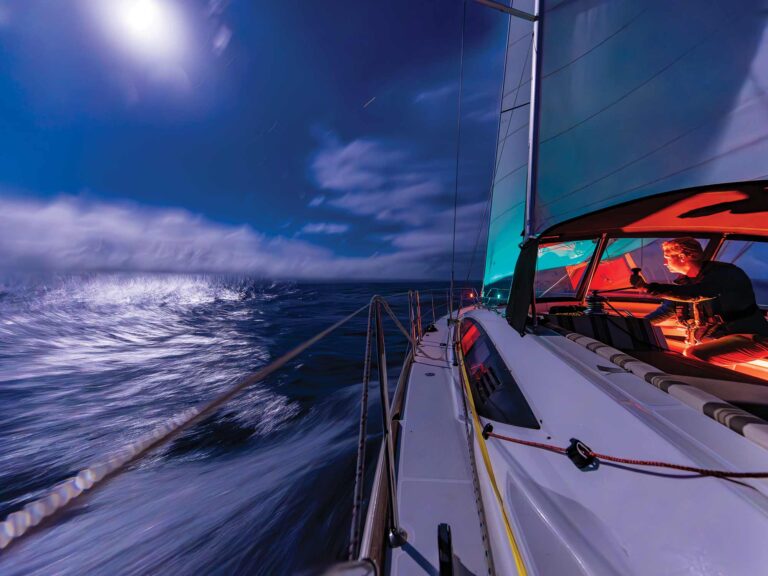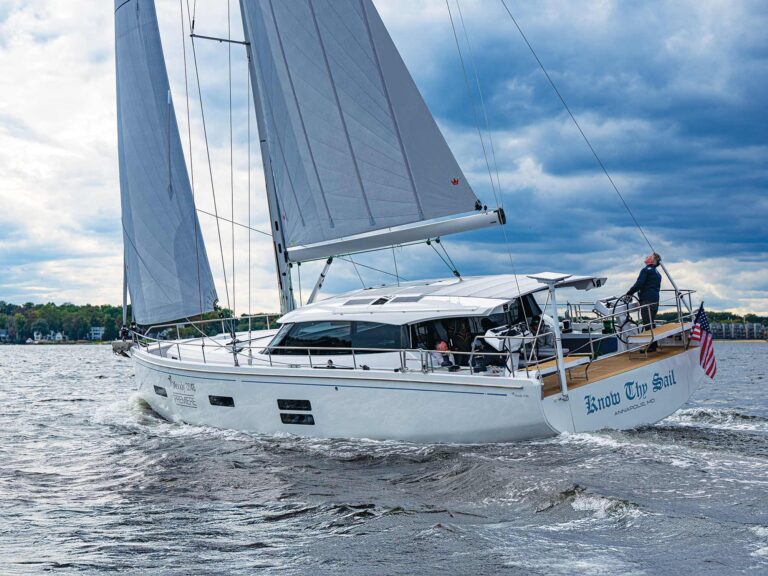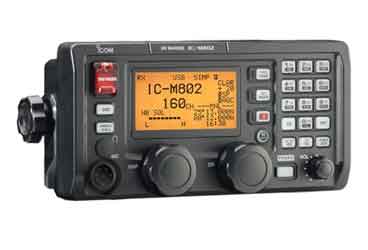
SSB
I first heard of ham radio as a young boy. I thought it would be fun to get my ham-radio license in the same way a young boy wants to be a firefighter or a policeman. I got older and forgot about some of my aspirations while I worked on schooling, a family, and a career. Then I had an experience that rekindled my desire to get my ham or amateur radio license.
Several years ago, I had the chance to help bring one of the Transpac race boats back from Hawai’i. We had an Iridium satellite phone to help keep in contact with friends and family. We also had a single-sideband radio that was even more useful. The cost of using the phone meant that it was used sparingly. Instead we relied on the SSB for daily email and check-ins with other sailors heading back to the mainland. My experience with the SSB served as a catalyst to encourage me to get my amateur radio license. Now that I’ve been through the process, I hope I can help you determine if it’s something you might want to pursue as well.
Are Ham and Marine SSB the Same?
Until I started studying for my amateur radio license, I thought ham and SSB radios were the same thing. When I learned they weren’t, I tried to figure out the differences. My hope was that one was a subset of the other. While there’s some overlap, you can do things with a marine SSB that you can’t do with a ham and visa versa.
Ham radio has a much wider range of frequencies, some of which overlap those in marine SSB There are also more transmission methods that can be used such as amplitude modulation and frequency modulation. Hams can also transmit using single-sideband, which is really just a modified form of AM.
Marine SSB has a number of frequencies that aren’t open to ham radio operators. While both ham and marine SSB operators can participate in the Caribbean M/M net on 7.241 MHz, only marine SSB can participate on Herb Hilgenberg’s Southbound II net on 12.359 MHz. A quick glance at a listing of the various cruising nets () and their frequencies cross referenced with the ham radio bands () shows that both ham and marine SSB users can access them. However there are a number that are only available to marine SSB
What’s Required for Marine SSB?
Most sailors know that they aren’t required to get an FCC license for their VHF radios. The only exceptions are if you can answer “yes” to any one of the following questions:
• Are you are required to have a radio by law (because of vessel size or usage)?
• Do you plan to communicate with or enter into foreign ports?
• Do you have a radio other than VHF, EPIRB, or radar?
Since marine SSB falls outside those radios listed in question three, you’re required to get an FCC license if you want to install one on your boat. The license is called a “ship station license” and currently costs $160. The license is good for 10 years but is non-transferable. That means if you sell your boat with your radio, the new owner will need to apply for his or her own license. Furthermore, you can’t take the radio out of your boat and install it in a new one without getting another ship station license.
In addition to the ship station license, at least one person on board (generally the owner of the boat) needs to get a restricted radiotelephone license. It costs $60 but is good for a lifetime. There is no need to take a test. Simply fill out the paperwork and send the FCC your money.
Both licenses can be obtained by filling out forms 159, 605, and its Schedule B. They can be found at the FCC’s website () along with instructions. You also have the option of applying online and using a credit card to pay the license fees. If you’re the kind of person that enjoys doing your own taxes, it’s a fairly straightforward process.
If you plan to do any offshore cruising, I highly recommend having a marine SSB radio. This will allow you to keep in contact with other sailors traveling outside your VHF range as well as various nets, which may be able to render assistance in case of a problem or emergency.
What’s Required for Ham?
Getting your ham license is a bit more complicated but costs a lot less. There are three different levels of licenses: technician, general, and amateur extra, and you have to pass the tests in order. That means you can’t take the amateur extra test without first passing the technician and general exams. Each test session costs $14, but you can take multiple tests at the same time. As with the ship station license, a ham license is good for 10 years. As long as you renew your license at the end of the 10-year period, you aren’t required to take the test again. If you do let your license lapse, you have two years to renew it before having to take the test again.
The technician license is actually pretty easy to get. The first time I took an online practice test, I passed using mostly common sense. However, I must confess that I have a degree in electrical engineering and so most of the topics covered by the test were a review. That being said, my 13-year-old son passed the test after studying for only a couple of hours, as did one of his friends. The downside to the technician license is that it doesn’t allow you to do much more than use the frequencies similar to marine VHF.
After I passed the technician license, the test administrators handed me the exam for the general qualification, and I took it the same night. This test wasn’t nearly as easy and required that I put in some study time. It opens up a lot of the frequencies common to marine SSB I bought the American Radio Relay League‘s study book from Amazon.com and spent a week going through the material before taking the test. Again, it was mostly a refresher from a lot of the stuff I learned back in school. However, there were one or two new topics specifically related to amateur radio, so I was glad I’d studied.
I passed my general exam and only missed one question, which pleased the test administrators. Then they handed me the extra amateur exam, for which I hadn’t studied. Naturally I didn’t pass but came amazingly close. I have the A.R.R.L. study guide and plan to take the test shortly.
So do You Need Your Ham License?
The short answer is “not really.” If all you plan to do is check into the regularly scheduled nets, then getting your ham license may be overkill. However marine SSB and ham radios aren’t like picking up a phone and calling someone a continent away. Certain frequencies work fine during the day, but won’t work at night. Others work better at night. Studying the information required to pass the ham general exam will give you the background you need to understand how your marine SSB works and how to use it to its fullest advantage.
I decided to get my ham license so I could participate in some of the sailing nets from the comfort of my home in the land-locked state of Utah. I don’t plan to do much talking and anyone can listen to the nets without having to have any type of FCC license. However, if someone has a problem like a broken watermaker (something that happened during the trip from Hawai’i that we were able to fix, thanks to the help of others), I wouldn’t be able to render assistance without a ham license.
When I sailed from Hawai’i to the mainland, I never felt alone. The constant contact with family and friends through email were thanks mostly to the marine SSB radio. Once I had trouble making the connection to send and receive the crew’s daily messages. I poked around a bit and tried a few different things before I was successful. Now that I have my ham radio license, I know what the problem was and could have solved it more quickly. Had it been an emergency, I might not have had that extra time.
I highly recommend that anyone planning on doing much long-distance sailing should minimally take the time to go through the ham license material. Going one step further and taking the test may be the incentive you need to help study. If you would like to take the test, the website can be used to find when the next test is being held in your area. Good luck.
Matthew Bennett has a bachelor of science in electrical engineering degree from Brigham Young University. He lives in Draper, Utah, with his family and sails Never Land_, his Catalina 250 on the Great Salt Lake._

